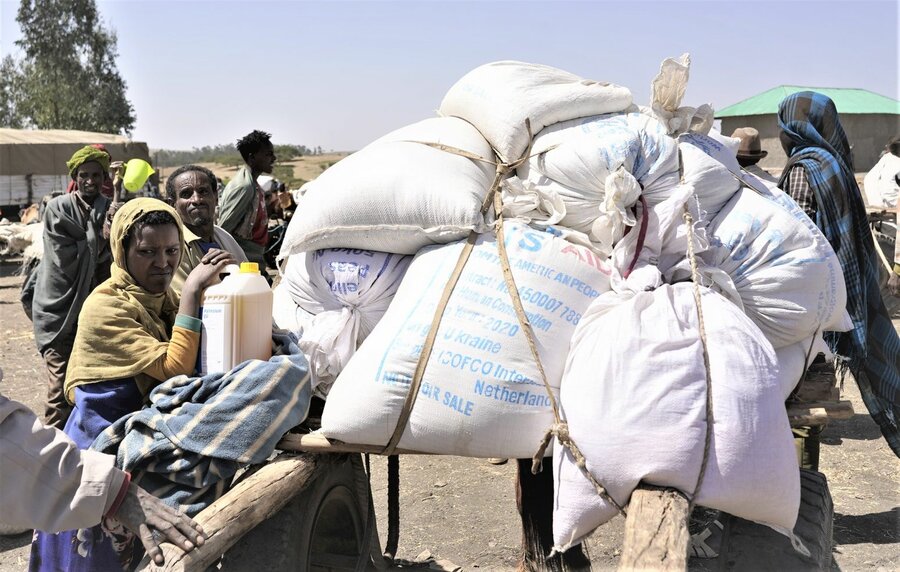Bulk carrier sets off from Ukraine with grain for WFP in first since start of war
The first shipment of Ukraine grain for World Food Programme operations since the war with Russia began left the Black Sea port of Pivdennyi in Yuzhny, Odesa province, this morning (16 August).
Some 23,000 metric tons of WFP wheat sailed out on the UN-chartered vessel Brave Commander, bound for the drought-hit Horn of Africa region, where catastrophic hunger threatens more than 20 million people. It is the latest vessel to have left Ukraine as part of the landmark Black Sea Initiative.
The ship aims to reach some of hungriest people in Ethiopia – like elderly couple Tesfaye and Tirhas, uprooted by conflict gripping the country’s North – even as a punishing drought leaves a trail of animal carcasses and parched fields in the South.

“Getting the Black Sea ports open is the single most important thing we can do right now to help the world’s hungry,” said WFP Executive Director David Beasley. “It will take more than grain ships out of Ukraine to stop world hunger, but with Ukrainian grain back on global markets we have a chance to stop this global food crisis from spiralling even further.”
The Horn of Africa is just one of many regions reeling from the near-complete halt of Ukrainian food exports. WFP and other humanitarians hope the most vital maritime traffic now resuming in and out of Ukraine’s Black Sea ports will help ease global supply disruptions that are disproportionately hitting the poorest.

“Ukraine was actually our number one supplier of commodities in the world. We purchased 880,000 metric tons in Ukraine last year,” said Marianne Ward, WFP Deputy Emergency Coordinator in Ukraine. “Four hundred million people across the world were fed by the farmers of Ukraine.
“That’s a huge hit to the world and to global food prices and to hunger across the globe, not having Ukraine’s bounty available.”
The grain shipment marks another key step in injecting food from a once-leading ‘breadbasket’ region back into markets at a time of record global hunger – while helping to empty Ukraine’s grain silos for the next harvest.
WFP has long warned that the “ripple effects” of the conflict in Ukraine are making large parts of the world ever more fragile and contributing to new humanitarian crises – such as in Sri Lanka, where three quarters of the population have been forced to eat less because of soaring prices.

“Overall, 94 percent of WFP country offices report rising food and nutrition needs due to the impact of the Ukraine crisis,” the organization said in a report last month, raising the prospect of social instability and migration in the most vulnerable locations.
Soaring food, fuel and fertilizer prices are combining with the already devastating effects of conflicts, climate change and the coronavirus pandemic. Even before the Ukraine war had started, WFP had warned 2022 would be a year of unprecedented needs.
In fact, needs are currently outstripping resources and WFP “has been forced to take from the hungry to feed the starving,” the report said.
WFP has had to reduce food rations and cash assistance to prioritize those who are in most need while stretching out support where feasible.
A record 345 million people in 82 countries today face acute food insecurity. Up to 50 million in 45 countries are on the edge of famine, and risk tipping over without humanitarian support.
This includes close to 900,000 people who are already facing catastrophic famine or famine-like conditions in parts of Afghanistan, Ethiopia, Somalia, South Sudan and Yemen.
WFP is calling for US$22.2 billion to reach 152 million people in 2022 at a time when the cost of foods it distributes, such as wheat, wheat flour, vegetable oil, peas and specialized nutritious foods has increased by US$27.1 million per month.
Somalia: Women and children are bearing the brunt of the Horn of Africa drought
Some of the most alarming hunger hotspots are places such as Somalia, where soaring food prices and the worst drought in 40 years threaten more than 7 million people with acute hunger by September – and nearly half the country’s children under 5 with severe malnutrition by the end of the year.
For some, like 5-year-old Mohammed, it’s already too late. He was buried in a shallow grave during his internally displaced family’s long trek in search of sustenance, in Somalia.
“We left our home because we had nothing left – we just had drought and hunger,” his mother, Mido, told WFP. “We were pastoralists and had cattle and camels, but we lost all our livestock and when our final animals died that was it. There was no water, no food for my children, no way to get money.”
Grain from Ukraine aims to reach many others also a step away from calamity.
Meanwhile, Ukraine itself is seeing intensifying hunger, six months into its conflict. One in three households is food-insecure, rising to one in two in parts of the East and South.
In July alone, WFP reached 2.9 million people with food and cash in Ukraine – a country that last year supplied WFP with two-thirds of its grains for hunger-fighting operations worldwide.
Acknowledgement: This export of wheat is the product of strong collaboration between the private sector – which is key in WFP's response to the global food crisis – and the government sector. WFP could not have arranged this shipment without critical emergency funding from USAID’s Bureau for Humanitarian Assistance, as well as significant contributions from the foundation of the long-time WFP supporter, and former Goodwill Ambassador, Howard G. Buffett and Minderoo Foundation, the Australian philanthropic organization of Andrew and Nicola Forrest.
